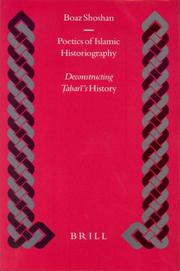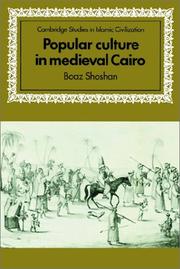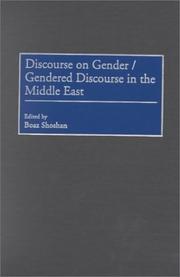| Listing 1 - 7 of 7 |
Sort by
|

ISBN: 9789047405092 9047405099 1433706490 9781433706493 1280859474 9786610859474 9789004137936 9004137939 Year: 2004 Publisher: Leiden Boston Brill
Abstract | Keywords | Export | Availability | Bookmark
 Loading...
Loading...Choose an application
- Reference Manager
- EndNote
- RefWorks (Direct export to RefWorks)
Offering a new approach to the study of Ṭabarī's History , the most comprehensive historical work written by a classical Muslim historian, this book applies concepts developed by critical theorists and suggests a reading of historiographical material that is not primarily concerned with reconstructing the facts. The book consists of two parts. Part one exposes the assumptions involved in writing classical Islamic history, especially the mimetic aspiration of the sources and the practice that subverts it. Part two examines in detail four significant events in the history of early Islam and demonstrates how a deconstructionist reading subjects endows these with a considerably different meaning and subjects them to new light.
Historiography. --- HISTORY. --- Ṭabarī, --- Tārīkh al-rusul wa-al-mulūk (Ṭabarī). --- History. --- Ṭabarī, --- Historical criticism --- History --- Authorship --- Criticism --- Historiography --- Islam --- Research --- Muḥammad ibn Jarīr al-Ṭabarī, --- Ṭabarī, Muḥammad ibn Jarīr, --- Tabari, Abu Dzhaʻfar Mukhammad b. Dzharir, --- Ṭabarī, Jarīr, --- Tabari, Sheykh, --- Ṭabarī, Abū Jaʻfar Muḥammad ibn Jarīr, --- أبو جعفر محمد بن جرير الطبري --- ابن جرير الطبري --- ابو جعفر محمد بن جرير طبرى --- الطبرى، --- الطبري --- الطبري، --- طبرى، --- طبري --- طبري، --- طبقات --- Ṭabarī, Muḥammad ibn Ǧarīr ibn Yazīd al- (0839?-0923) --- Ṭabarī, Muḥammad ibn Ǧarīr ibn Yazīd al- (0839?-0923). Aẖbār al-rusul wa-al-mulūk --- Historiographie --- Historiens musulmans --- Moyen âge --- Islamic civilization --- Tabari,
Book
ISBN: 9780815357940 081535794X 9781138918948 9781317420262 9781315688145 9781317420248 9781317420255 Year: 2016 Publisher: London Routledge
Abstract | Keywords | Export | Availability | Bookmark
 Loading...
Loading...Choose an application
- Reference Manager
- EndNote
- RefWorks (Direct export to RefWorks)
The early Arab conquests pose a considerable challenge to modern-day historians. The earliest historical written tradition emerges only after the second half of the eighth century- over one hundred years removed from the events it contends to describe, and was undoubtedly influenced by the motives and interpretations of its authors. Indeed, when speaking or writing about the past, fact was not the only, nor even the prime, concern of Muslims of old. The Arabic Historic Tradition and the Early Islamic Conquests presents a thorough examination of Arabic narratives on the early Islamic conquests. It uncovers the influence of contemporary ideology, examining recurring fictive motifs and evaluating the reasons behind their use. Folklore and tribal traditions are evident throughout the narratives, which aimed to promote individual, tribal and regional fame through describing military prowess in the battles for the spread of Islam. Common tropes are encountered across the materials, which all serve a central theme; the moral superiority of the Muslims, which destined them to victory in God's plan.
297 <09> --- 297 <09> Islamisme. Mahométisme--Geschiedenis van ... --- 297 <09> Islam. Mohammedanisme--Geschiedenis van ... --- Islamisme. Mahométisme--Geschiedenis van ... --- Islam. Mohammedanisme--Geschiedenis van ... --- Islam. Mohammedanisme--Geschiedenis van --- Islam --- HISTORY --- Historiography. --- Ancient --- General. --- Islamic Empire --- Islamic Empire. --- Historiography --- Islam. Mohammedanisme--Geschiedenis van .. --- Islam. Mohammedanisme--Geschiedenis van .

ISBN: 9780521432092 9780511524004 9780521894296 0511524005 052143209X 0521894298 9780521894298 Year: 2002 Publisher: New York : Cambridge University Press,
Abstract | Keywords | Export | Availability | Bookmark
 Loading...
Loading...Choose an application
- Reference Manager
- EndNote
- RefWorks (Direct export to RefWorks)
This is the first book-length study of popular culture in Islamic society, drawing together a wealth of Arabic sources to explore literature, religious celebrations and annual festivities in medieval Cairo and addressing questions of relevance throughout the Islamic world and beyond. Dr Shoshan examines popular religion against the background of the growing influence of Sufism, discussing the sermons of Abn Ata Allah, a leading Cairene Sufi, which shed considerable light on the beliefs of ordinary Muslims. The author then analyses the importance of a biography of Muhammad, which has been attributed to Abu'l-Hasan al-Bakri and suppressed by the learned, and traces the origins and popular practices of the annual Nawruz festival. Finally he explores the political beliefs and economic expectations of the Cairene commoners and demonstrates the complex relationship between the culture of the Cairene elite and that of the people.
Islamic civilization. --- Manners and customs. --- Alltag, Brauchtum. --- Cairo (Egypt) --- Egypt --- Social life and customs. --- Le Caire (Égypte) --- Islamic civilization --- Civilization, Islamic --- Muslim civilization --- Civilization --- Civilization, Arab --- Kairo (Egypt) --- Kair (Egypt) --- Qāhirah (Egypt) --- Kahirah (Egypt) --- Caire (Egypt) --- Le Caire (Egypt) --- Ḳahir (Egypt) --- القاهرة (Egypt) --- al-Qāhirah (Egypt) --- القاهرة (مصر) --- al-Qāhirah (Miṣr) --- قاهرة (Egypt) --- O Caire (Egypt) --- Lo Cayiro (Egypt) --- Lo Quèro (Egypt) --- Каир (Egypt) --- Qahirä (Egypt) --- Горад Каір (Egypt) --- Horad Kair (Egypt) --- Каір (Egypt) --- Кайро (Egypt) --- El Caire (Egypt) --- Káhira (Egypt) --- Κάιρο (Egypt) --- El Cairo (Egypt) --- El Cairu (Egypt) --- Keiro (Egypt) --- Caireo (Egypt) --- O Cairo (Egypt) --- 카이로 (Egypt) --- Il Cairo (Egypt) --- קהיר (Egypt) --- Manners and customs --- Culture populaire --- Moeurs et coutumes --- Arts and Humanities --- History
Book
ISBN: 9789004413252 9004413251 900441326X 9789004413269 Year: 2020 Publisher: Leiden Boston
Abstract | Keywords | Export | Availability | Bookmark
 Loading...
Loading...Choose an application
- Reference Manager
- EndNote
- RefWorks (Direct export to RefWorks)
"In Damascus Life 1480-1500: A Report of a Local Notary Boaz Shoshan offers a microhistory of the largest Syrian city at the end of the Mamluk period and on the eve of the Ottoman conquest. Mainly based on a partly preserved diary, the earliest available of its kind and written by Ibn Ṭawq, a local notary, it portrays the life of a lower middle class who originated from the countryside and who, through marriage, was able to become a legal clerk and associate with scholars and bureaucrats. His diary does not only provide us with unique information on his family, social circle and the general situation in Damascus, but it also sheds light on subjects of which little is known, such as the functioning of the legal system, marriage and divorce, bourgeois property and the mores of the common people".
Arabs --- Notaries --- Notaries public --- Notary publics --- Justices of the peace --- Non-contentious jurisdiction --- Ethnology --- Semites --- Diaries --- Legal status, laws, etc. --- Ibn Ṭawq, Aḥmad ibn Muḥammad, --- Aḥmad ibn Muḥammad ibn Ṭawq, --- Aḥmad Ibn Ṭawq, --- إبن طوق، أحمد بن محمد --- Diaries. --- Damascus (Syria) --- Dimashq (Syria) --- Dameśeḳ (Syria) --- Damascus --- Damas (Syria) --- Şam (Syria) --- History --- Social conditions --- Social life and customs.

ISBN: 0275964779 Year: 2000 Publisher: Westport (Conn.) Praeger
Abstract | Keywords | Export | Availability | Bookmark
 Loading...
Loading...Choose an application
- Reference Manager
- EndNote
- RefWorks (Direct export to RefWorks)
Book
Year: 1981 Publisher: Ann Arbor Xerox university microfilms international
Abstract | Keywords | Export | Availability | Bookmark
 Loading...
Loading...Choose an application
- Reference Manager
- EndNote
- RefWorks (Direct export to RefWorks)
Book
Year: 1978 Publisher: Princeton
Abstract | Keywords | Export | Availability | Bookmark
 Loading...
Loading...Choose an application
- Reference Manager
- EndNote
- RefWorks (Direct export to RefWorks)
| Listing 1 - 7 of 7 |
Sort by
|

 Search
Search Feedback
Feedback About UniCat
About UniCat  Help
Help News
News